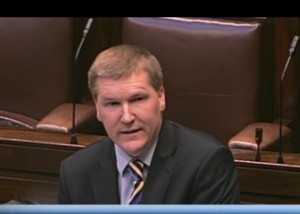23 September 2019
By Bryan Smyth
bryan@TheCork.ie
Central Bank analysis a wake-up call for the Minister – McGrath
Fianna Fáil Spokesperson on Finance Michael McGrath TD has expressed concern at the findings contained in a Central Bank report published today. The report assesses the impacts on the public finances from a decline in corporation tax receipts and an international slowdown, and also in the scenario of a disorderly Brexit.
Deputy McGrath said, “The risks facing Ireland from its growing dependence on corporation tax receipts have been known for quite some time and can no longer be ignored. Corporation tax accounted for just over €4.5 billion in 2014 while in 2018 it was worth nearly €10.4 billion. That is an extra €6 billion extra in receipts in a very short space of time.
“At the time of Budget 2015 it was anticipated that only €5 billion in corporation tax would be received in 2018. The growth has been extraordinary, and we know that only a very small number of companies are responsible for this increase. According to figures from the Revenue Commissioners, some 45% of corporation tax from 2018 came from just 10 companies.
“The Irish Fiscal Advisory Council also pointed to Ireland’s dependence on corporation tax as a key risk that needs to be addressed. The Central Bank in this report assesses the impact on the public finances from a decline of €3 billion in our corporation tax receipts combined with an international slowdown. The results show that such a negative shock would have significant adverse implications.
“According to the report, the general government balance would deteriorate by around 1.5% over the medium term and the balance would remain in deficit until 2025. Over that time span the Debt to GNI* ratio would be 10% higher than what it would be without such a shock.
“We are facing a time of significant change on the international corporation tax front. The OECD BEPS process is ongoing, and moves are still being made in the EU to fundamentally reform how corporation tax is calculated. This all means that we cannot expect corporation tax receipts to be as large and as significant as they are now.
“The Minister must take heed to the findings from both IFAC and the Central Bank. It is all very well to have reports on the sustainability of our corporation tax receipts, but we need genuine protections to be put in place. Fianna Fáil proposed the establishment of the Rainy-Day Fund in order to guard against this very eventuality. Our excess corporation tax receipts need to be put away because they will not be there forever,” concluded McGrath.


